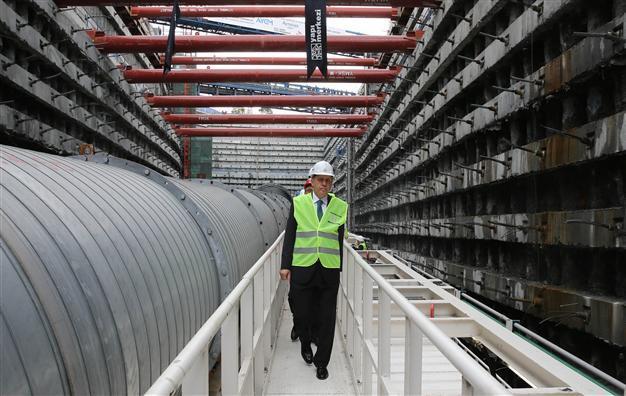Turkish nation to elect its ‘leader,' declares coy PM Erdoğan
ANKARA

PM Erdoğan says the next president will de facto become the executive office and 'walk the walk of the leader' as he will be elected by a popular vote. AA photo
The Turkish nation will elect its “leader” on Aug. 10, Prime Minister Recep Tayyip Erdoğan has declared, without openly announcing whether he will run for the presidential office in order to replace his long-time comrade, incumbent President Abdullah Gül.Despite Erdoğan’s uncharacteristic coyness, his strong emphasis on the word “leader” has been widely interpreted as a reflection of his well-known willingness to assume a de facto executive role, not a ceremonial one as outlined in the current Constitution, if he eventually becomes the first ever president of the country to be elected by direct vote.
He has long pushed for a constitutional amendment that will either introduce a presidential system or a partisan-president system in which the president-elect does not have to sever his party affiliation. However, his efforts have so far failed due to the opposition’s refusal to cooperate on such an amendment.
Erdoğan has argued that the next president will de facto become the executive office as he will be elected by a popular vote.
‘The president of the nation’
Referring to the systemic crisis that gripped Turkey in the run-up to the August 2007 presidential elections, Erdoğan said April 19 that his Justice and Development Party (AKP) “stood tall and took our precautions.”
President Gül was elected in August 2007 after months of tension and controversy. His election became possible only after the ruling AKP narrowly escaped an intervention by the Turkish Armed Forces (TSK) in 2007, when military forces issued a warning against the candidacy of then-Foreign Minister Gül, mainly because his spouse wore a headscarf, which was seen as an alarming symbol of “fundamentalism.”
“We amended the Constitution. We said, ‘From now on, people will elect the president.’ Here, now, the nation will go to the ballot boxes in order to elect its own president,” said Erdoğan, in a speech delivered at a foundation laying ceremony for a major infrastructure project - the Eurasia Tunnel, also known as the Istanbul Strait Road Tube Crossing - built under the Bosphorus Strait.
It was Erdoğan’s first public speech after Gül appeared to rule himself out as a potential future prime minister on April 18, saying a “Putin-Medvedev model” under which he might swap roles with Erdoğan was not suitable for Turkey.
“I don’t have any political plan for the future under today’s conditions,” Gül told reporters, when asked about the presidential election.
Asked if a “Putin-Medvedev model” might be conceivable, he said such a formula would not be “appropriate” for a democracy. Nonetheless, he refrained from elaborating on what had led to his decision.
Erdoğan told reporters after Friday prayers that he had not heard Gül’s words and would not comment before speaking with the president directly.
Arınç: Gül not just ‘somebody’
While Erdoğan preferred to stay away from directly speaking about the issue publicly, Deputy Prime Minister Bülent Arınç painted a rosy picture of the current situation.
“We believe and know that if our honorable prime minister wants to run for the presidency as a result of his consultations, our honorable president will feel honored about this and will support his candidacy,” Arınç said on April 19 when asked by reporters to comment on Gül’s latest statement.
The deputy prime minister, who was a keen supporter of Gül’s candidacy for the presidency in 2007, made a point of addressing the president’s probable “uneasiness” about the current conjecture, but appeared to play down a possible parting of the ways between Erdoğan and Gül.
“Frankly, everybody has the right to consider and give an opinion on these issues. However, while making these calculations, assuming our honorable president is ‘just somebody’ as an actor in this issue, or citing his name in various possibilities, may perhaps sadden our honorable president,” Arınç said.
His remarks were an acknowledgement of the fact that Gül’s recent statement threw open the question of who might succeed Erdoğan should he run for the presidency in the August election as expected. Gül had been seen as a potential future prime minister with Erdoğan as head of state.
















